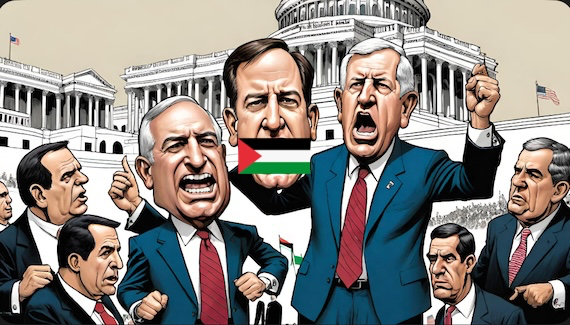
Israel is pushing Political Allies in Congress to outlaw Conversations about the Genocide in Gaza; it won’t Work
Ramzy Baroud 12/05/2024
“Palestine Exception,” Digital, Dream / Dreamland v3, 2024
Unlike previous investigations — the Goldstone Report probing the 2008-09 war on Gaza, for example — the international community has already taken some practical steps to hold Israeli war criminals to account. The ICC has issued warrants for the arrest of Israeli Prime Minister Benjamin Netanyahu and former Defence Minister Yoav Gallant.
Moreover, those who routinely come to Israel’s defence, such as the US and other Western governments, are now clashing directly with the same canon of international law that they helped articulate after World War II, depriving them of any credibility as “neutral” parties in this issue. For example, US President Joe Biden called the warrants “outrageous”, while the French Ministry for Europe and Foreign Affairs claimed that Netanyahu and other ministers enjoy immunity since Israel is not a party to the ICC.
There is also the fact that, despite the inherent pro-Israel bias of Western media, Palestinian journalists, isolated and killed in large numbers, have still been able to communicate details of the genocide to the rest of the world, making it impossible for Israel to hide its crimes.
Indeed, many Israeli soldiers have posted videos and photos of themselves committing war crimes on social media.
The impact of the Israeli genocide on Gaza has thus already penetrated many layers of public opinion, a fact which is unprecedented in history.
Until now, the conversation on Palestine has generally been confined to specific strata of society, reaching academics, social justice activists and other groups interested in politics and global issues. Today, though, ordinary people have been made aware of the conversation, to the extent that it is believed widely that anger over Gaza has contributed towards determining the outcome of the latest US presidential and other elections.
In Africa, the growing political and public interest in the Palestinian struggle has re-enlivened the spirit of anti-colonial, liberation struggles on the continent, bringing many countries, from South Africa to Algeria, back to the front lines of global solidarity.
No amount of Israeli propaganda, unjust laws, unfair categorisations of Palestinians or claims about Israel’s “most moral army” will ever succeed in reversing these realities. There can be no reset buttons. Rather, the global momentum of Palestine’s liberation will accelerate in the coming months and years.
The price exacted from the Palestinian people for this earth-shattering moment has been high and painful, but the history of all national liberation struggles, Palestine included, demonstrates that freedom doesn’t come cheap.